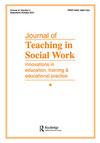研究生社会工作远程教育项目中学生和教师对反馈的看法
IF 0.9
Q3 EDUCATION & EDUCATIONAL RESEARCH
引用次数: 0
摘要
摘要:在线社会工作教育工作者有责任为学生培养高质量的学术成长体验。导师向学生提供的反馈旨在进一步实现这一目标。本研究的目的是了解社会工作教师和学生在一个完全在线的MSW项目中如何重视教学反馈。开放式调查问题用于收集教师和学生的观点。定性分析揭示了类似的主题。教员们认为反馈的主要目的是促进学习,提高学习效率,提高学生的社会工作能力,并促进参与和联系。MSW学生认为反馈的主要重要性在于它促进了学生的发展,评估了学生的进步,促进了与讲师的互动和沟通,并澄清了误解。与反馈在实地项目中的传统作用相反,MSW教师和学生都认为,在线形式的反馈不仅提高了内容理解,而且影响了学生和教师的关系。这项研究强调了培训教师提供反馈的必要性,这种反馈符合远程教育学生在在线教育中体验联系和支持的愿望。本文章由计算机程序翻译,如有差异,请以英文原文为准。
Student and Faculty Perceptions on Feedback in a Graduate Social Work Distance Education Program
ABSTRACT Online social work educators are responsible for fostering high quality academic growth experiences for their students. Feedback instructors provide to students aims to further this goal. The purpose of this study is to understand how social work instructors and students in an entirely online MSW program value instructional feedback. Open-ended survey questions were used to gather instructor and student perspectives. Qualitative analyses revealed similar themes. Faculty felt the main purpose of feedback was to facilitate learning, improve effectiveness of learning, enhance student social work capability, and foster engagement and connection. MSW students felt the main importance of feedback was that it fostered student development, assessed student progress, facilitated interaction and communication with instructor, and clarified misunderstandings. Contrary to the traditional role of feedback in on-the-ground programs, both MSW faculty and students felt that feedback in the online modality not only increased content comprehension but also influenced the student and instructor relationship. This study highlights the need to train faculty to deliver feedback that is consonant with distance education students’ desire to experience connection and support as a part of their online education.
求助全文
通过发布文献求助,成功后即可免费获取论文全文。
去求助
来源期刊

Journal of Teaching in Social Work
EDUCATION & EDUCATIONAL RESEARCH-
CiteScore
1.20
自引率
0.00%
发文量
36
期刊介绍:
The Journal of Teaching in Social Work fills a long-standing gap in the social work literature by providing opportunities for creative and able teachers—in schools, agency-based training programs, and direct practice—to share with their colleagues what experience and systematic study has taught them about successful teaching. Through articles focusing on the teacher, the teaching process, and new contexts of teaching, the journal is an essential forum for teaching and learning processes and the factors affecting their quality. The journal recognizes that all social work practitioners who wish to teach (whatever their specialty) should know the philosophies of teaching and learning as well as educational methods and techniques.
 求助内容:
求助内容: 应助结果提醒方式:
应助结果提醒方式:


